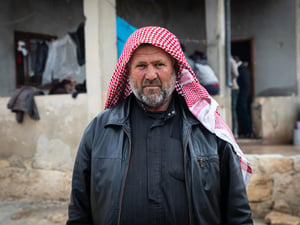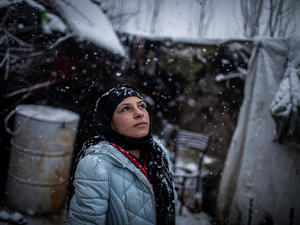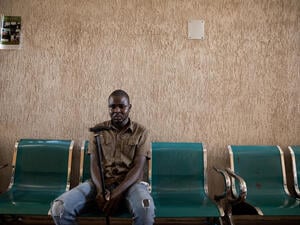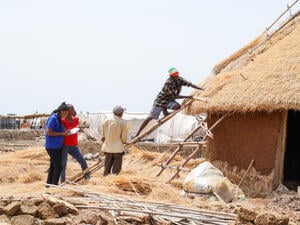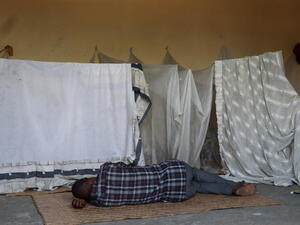Shelter struggle in Greece as winter arrives, EU urged to speed relocations
Shelter struggle in Greece as winter arrives, EU urged to speed relocations

Winterization moves forward and the first prefab houses are ready to be transferred to Northern Greece.
With the onset of winter, improving living conditions for asylum-seekers and migrants continues to be the number one priority for humanitarian actors in Greece. It is also still a major challenge. People living in tents out in the open have been moved to alternative accommodation and UNHCR’s accommodation scheme, funded by the European Commission, has provided 20,000 badly-needed places for refugees and asylum seekers. But serious challenges remain and many others are in substandard shelters lacking proper protection from winter conditions.
Conditions vary greatly. Some sites are in a poor state and lack services such as psychosocial counselling, health care and interpretation, or even proper security. Over the past months, in a joint effort by humanitarian organizations and authorities under the coordination of Greece’s Ministry of Migration Policy, conditions have been improved in the majority of the over 40 official sites, including through upgrades of infrastructure. UNHCR was involved in carrying out improvements and maintenance at 15 of these sites.
In addition, in eight government-run sites people living in tents have been moved into UNHCR prefabricated houses. So far, over 2,600 people have been moved into the prefabs and by the end of the year this figure will rise to 4,000. To help matters in all sites, UNHCR and non-governmental organizations have been working to keep people warm and dry. This has involved delivering over 200,000 sleeping bags, blankets and clothes, and other winter relief items.
The UNHCR accommodation programme, which reached its targeted goal of 20,000 places this week, provides housing for candidates for the EU Emergency Relocation Mechanism and for asylum-seekers considered especially vulnerable. The programme, which started in January, supports the Greek Government’s response.
Some 58 per cent of the accommodation is small temporary apartments, run by UNHCR’s partners. A further 25 per cent is hotel rooms at special rates. With funding mainly from the European Union, the programme also hosts asylum-seekers in buildings rented for this purpose as well as with Greek host families. Beneficiaries are also provided with psychosocial, legal and interpretation services. Many of those accommodated are waiting to be relocated. As of 7 December, only 6,259 asylum seekers had left Greece under the EU Relocation Mechanism, less than 10 per cent of the 66,400 agreed last year. This is an unacceptably poor response, causing unnecessary uncertainty for people, affecting children including those who are unaccompanied, and prolonging a humanitarian situation for Europe that should have been resolved months ago and which risks encouraging people to move on with the help of smugglers. UNHCR appeals to European countries to do the right thing, by ending this situation without further delay.
As the programme also benefits those who are considered especially vulnerable, UNHCR has been asked to move people out of government-run sites that have not been readied for winter in time. Last week, 1,300 men, women and children were transferred from the windy camps in Petra Olympou in Northern Greece and Malakasa in the Attica region to accommodation under UNHCR’s programme. Earlier in the autumn, some 300 people were moved out of Kipselochori in central Greece and Tsepelovo in western Greece. These were unsuitable for winter and have been closed for the cold season.
Children who are unaccompanied or separated from their families are particularly vulnerable to the accommodation and protection gaps in Greece. We are currently providing over 600 places for unaccompanied children in specialized shelters where they get care and counselling. According to official figures, 1,200 girls and boys live in such shelters, with another 1,200 children urgently needing appropriate accommodation.
Another challenge is continued overcrowding and inadequate conditions in official shelters, including the Reception and Identification Centres such as those at Moria or Vathy on the islands of Lesvos and Samos. There increased tension and violence exposes people to further risk. UNHCR continues to urge that finding alternative accommodation be made a priority. This is important for easing the deplorable condition and we are supporting these efforts in coordination with the authorities. In addition, to improve the living conditions, it is of paramount importance that the UNHCR-assisted transfers of asylum-seekers admitted to the procedure to the mainland continue, in close cooperation with the Greek Reception Service and Police. In the past two months, we identified, informed and moved some 900 people from overcrowded island sites to our accommodation programme. All asylum-seekers should have their claims fully registered and processed in time and stronger support from the European Asylum Support Office (EASO) to Greece is needed for this.
For more information on this topic, please contact:
- In Geneva, William Spindler, [email protected], +41 79 217 3011
- In Athens, Roland Schoenbauer, [email protected], +30 69 48 088 544
- In Geneva, Babar Baloch, [email protected], +41 79 513 9549

